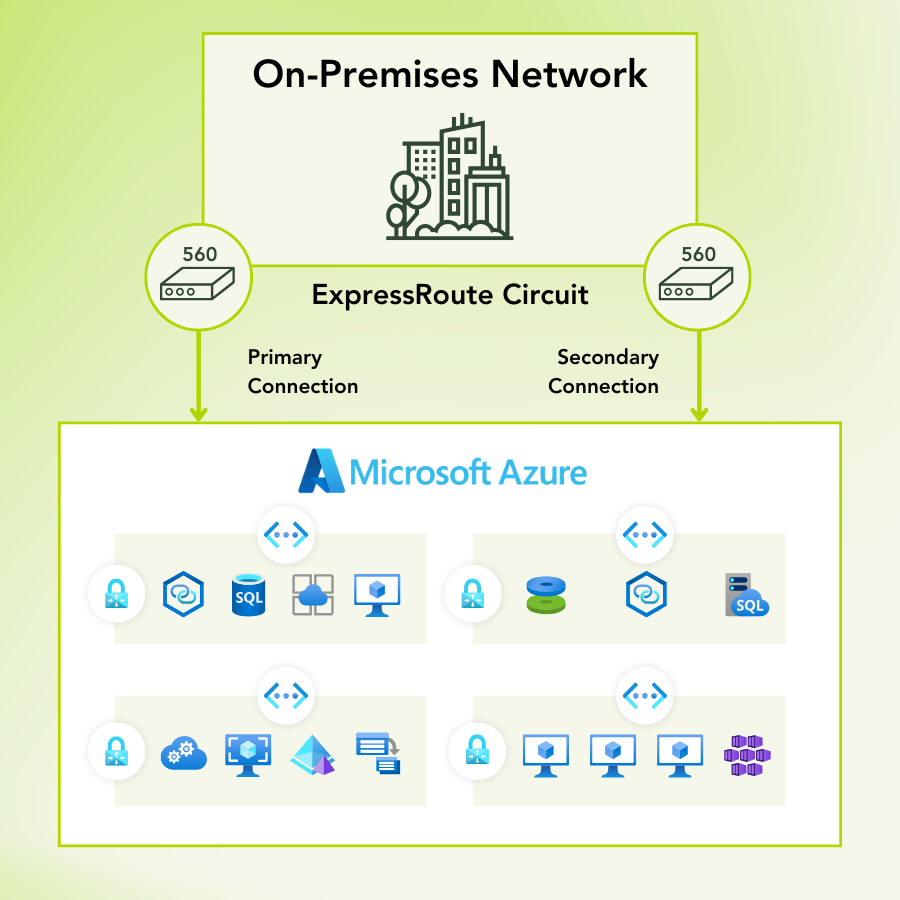When business-critical applications depend on consistent performance and minimal downtime, even a small disruption can have a major impact on revenue, user experience, or compliance.
If reliability, guaranteed bandwidth, and robust security are top priorities, Azure ExpressRoute may be the right solution for you.
By offering a dedicated private link to Microsoft Azure that bypasses the public internet, ExpressRoute delivers predictable throughput, lower latency, and fewer security worries. It’s the difference between adapting cloud services on the fly and getting slowed down by unpredictable connections.
So, how does Azure ExpressRoute work, and why is it the right choice for your business? Learn more about key benefits, how it stacks up against other solutions, popular use cases, and best practices you can follow to get started.
Why Azure ExpressRoute matters
Any business that requires reliable connectivity to boost performance for their networks and applications running on Azure can benefit from Azure ExpressRoute.
Here are just a few of the reasons why businesses choose Azure ExpressRoute:
Predictable Network Performance
Predictability is the goal of any network. After all, you need to provide a consistent and reliable experience regardless of how and where a user accesses it.
High throughput allows you to transfer data at speeds ranging from a few Mbps to multiple Gbps, supporting a wide range of use cases.

Consistent low-latency connections also ensure fewer congestion points exist, leading to more stable performance for critical workloads.
Enhanced Security and Compliance
Security and compliance are top priorities today, with data, privacy, and security regulations becoming stricter and stricter.
Having dedicated, private paths keeps traffic off the public internet, limiting exposure to cyber threats.
It also supports regulatory alignment, ensuring easier and more straightforward compliance for sectors like finance, healthcare, or government.
Improved Reliability
What good is your network if it’s not reliable? Reliability is one of the most important aspects of connectivity.
Azure ExpressRoute are SLA-backed, meaning Microsoft guarantees uptime and performance.
They also simplify disaster recovery, offering faster replication and backup options to support your business continuity planning.
Flexible Network Integration
Cloud environments are more complex than ever, with many companies running hybrid and multi-cloud deployments. Azure ExpressRoute supports both options for environments running within Azure.
Hybrid cloud environments can treat Azure like an extension of your data center without sacrificing control. The same goes for multi-cloud deployments, where Azure ExpressRoute can easily coexist with other providers while providing Azure workloads with a dedicated circuit.
How ExpressRoute stacks up against a standard VPN
Clearly, Azure ExpressRoute can provide businesses with dedicated private connectivity to the cloud. But how do they stack up against VPNs?
Here’s a detailed breakdown comparing these two options:
| Aspect | VPN over Public Internet | Azure ExpressRoute |
|---|---|---|
| Connection Path | Public internet | Private, dedicated circuit |
| Performance | Varies with internet traffic | Consistent, high throughput, low latency |
| Security | Encrypted but shared public paths | Encrypted private link, reduced attack surface |
| Reliability | Dependent on ISP and internet load | SLA-backed, isolated from public congestion |
| Ideal Use Case | Smaller or non-critical workloads | Mission-critical data, large-scale or regulated needs |
Connection Path
VPN over Public Internet: Public internet
Azure ExpressRoute: Private, dedicated circuit
Performance
VPN over Public Internet: Varies with internet traffic
Azure ExpressRoute: Consistent, high throughput, low latency
Security
VPN over Public Internet: Encrypted but shared public paths
Azure ExpressRoute: Encrypted private link, reduced attack surface
Reliability
VPN over Public Internet: Dependent on ISP and internet load
Azure ExpressRoute: SLA-backed, isolated from public congestion
Ideal Use Case
VPN over Public Internet: Smaller or non-critical workloads
Azure ExpressRoute: Mission-critical data, large-scale or regulated needs
Common Azure ExpressRoute use cases
How are businesses using Azure ExpressRoute to boost network performance and reliability?
Here are a few popular use cases we’ve seen from our customers:
- Data Center Extension: Extend on-premises environments into Azure without compromising speed or stability.
- Large-Scale Data Migrations: Migrate massive datasets without frequent timeouts or unpredictable internet slowdowns.
- Disaster Recovery & Business Continuity: Rely on a dedicated link for efficient replication and backups.
- Highly Regulated Operations: Keep data off the public web, simplifying meeting compliance requirements.
Deploy secure, reliable, and high-performance connectivity with Azure ExpressRoute
Azure ExpressRoute deployment can be intricate, particularly for enterprises juggling compliance requirements or diverse environments.
Momentum offers support at every stage, including:
- Strategic Planning: Aligning ExpressRoute with broader IT objectives and growth plans.
- Implementation & Configuration: Coordinating circuit provisioning, gateway setup, and routing specifics.
- Ongoing Optimization: Monitoring and fine-tuning performance as your workloads evolve.
Are you interested in exploring your options for securing applications while boosting performance? Contact us today to discuss your configuration options for Azure ExpressRoute.



